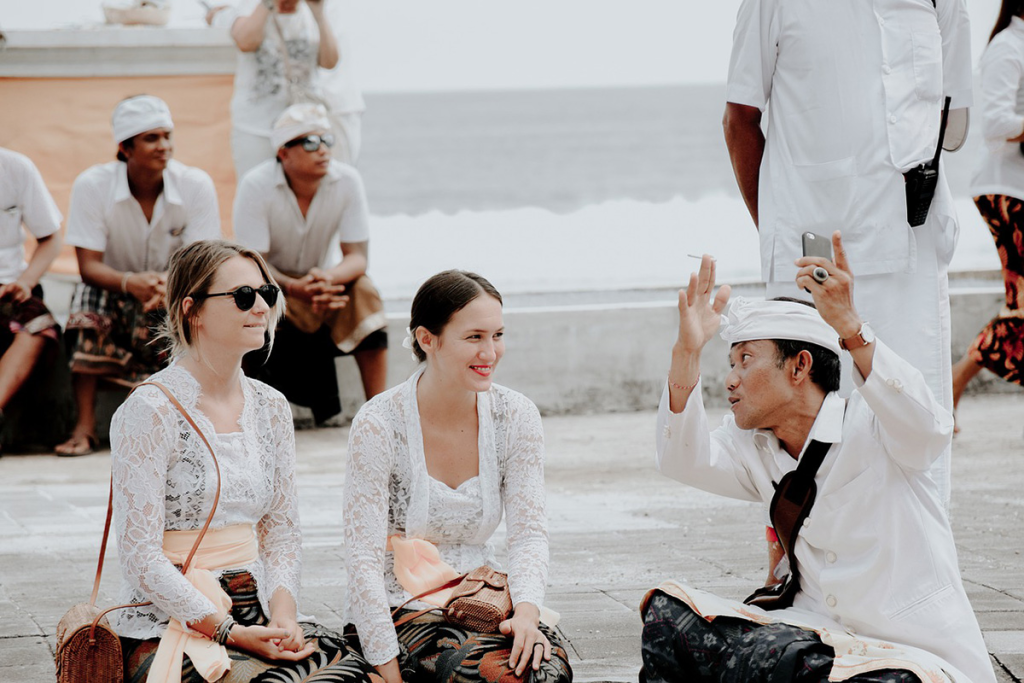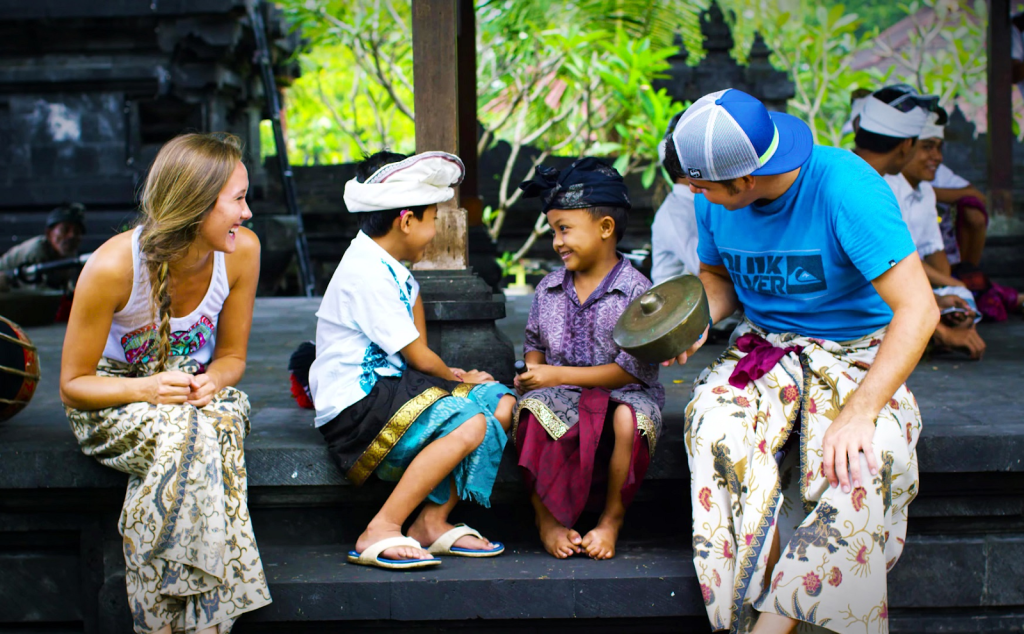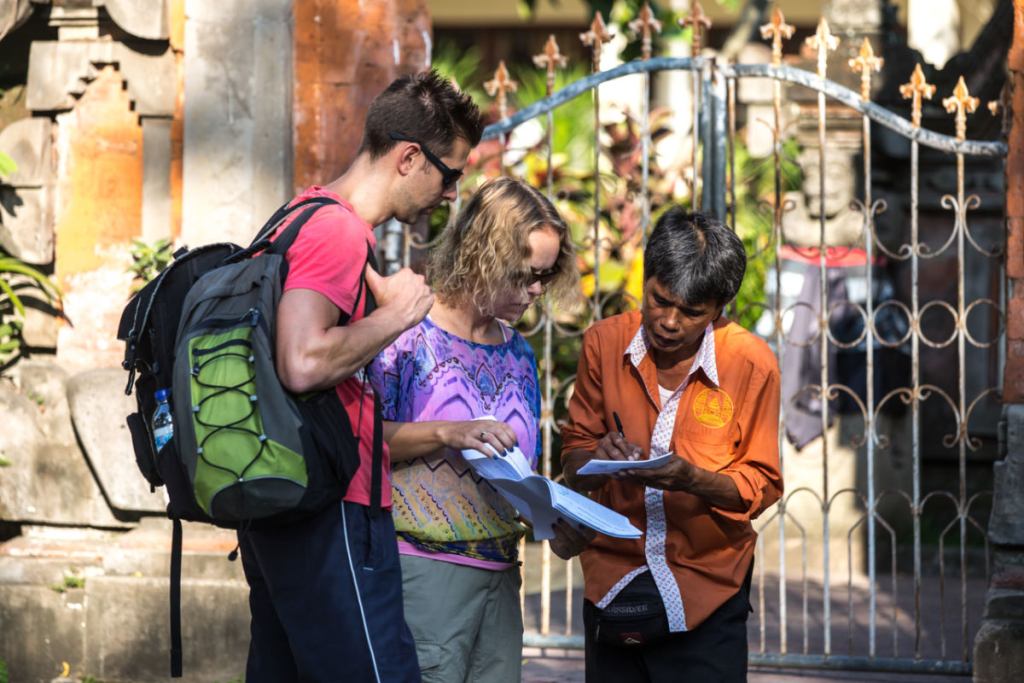Languages Spoken in Bali
Most people in Bali speak Indonesian (Bahasa Indonesia) and Balinese. Travellers mainly use English. You will hear all three spoken across the island.
Do travellers need to learn the local languages to enjoy their Bali holiday? No, English is enough.
But it always helps to be aware of a few Indonesian or Balinese words when ordering food at a warung, shopping in markets, speaking to a driver, asking for directions, or greeting someone politely. It often makes interactions smoother and warmer.
This guide gives an overview of the languages spoken in Bali and a few easy phrases you can use during your trip.

What Languages are Spoken in Bali?
Bahasa Indonesia
Indonesian is the national language of Indonesia. All locals learn it in school.
Where do locals use Indonesian?
- In most official written communication.
- On road signs, in menus, newspapers, government documents, and local television.
- When Bali locals speak to each other at workplaces or with someone from another Indonesian island.
Where can travellers use Indonesian?
Travellers can speak Indonesian when visiting warungs, shopping in small markets, or spending time in rural villages. It also helps when speaking politely to elders or asking for small favours.
Highlights of Indonesian:
- Easy to pronounce and remember: Indonesian is simple and phonetic. Words sound exactly the way they are written. There are no confusing verb tenses, no gendered nouns, and very few exceptions.
- Widely spoken: If you learn a few Indonesian words, you can use them in the rest of the country, Jakarta, Lombok, Java, Sumatra, or anywhere else in the archipelago.
Balinese
Balinese is the language most locals grow up hearing at home. In many rural areas, Balinese is often the first choice before Indonesian.
Where do locals use Balinese?
- At temple ceremonies.
- In village meetings.
- At markets.
- While speaking to parents, grandparents, neighbours, and other community members.
Where can travellers use Balinese?
Travellers can speak Balinese at a local’s home, in ceremonies, cultural events and in village communities. They do not need to learn this language for daily interactions with locals. It feels personal when they use it at the right moment.
Highlights of Balinese:
- Variations: Balinese has several speech levels based on age, respect, and social context. Locals naturally adjust their tone depending on whom they are speaking to.
- Written vs spoken Balinese: Balinese today is mostly a spoken language. The traditional script, Aksara Bali, appears on temples, gateways, ceremonial banners, and cultural signage. Day-to-day communication happens in speech, even among locals who know the script.
English
English is widely spoken across Bali because tourism is the island’s main industry.
Where can travellers use English?
Travellers can use English in hotels, cafés, and restaurants. Staff at spas, beach clubs, small shops, convenience stores, taxis, and tour companies are also comfortable speaking English. Locals in Ubud, Seminyak, Canggu, Uluwatu, Legian, Jimbaran, Nusa Dua, Sanur, or Kuta use English when speaking to travellers.
Rural villages and traditional markets may speak less English. But locals remain patient, polite, and eager to help.
Other Languages
Bali is home to people from many parts of Indonesia. You will hear Javanese, Sasak, Madurese, and Sumbawa languages in different communities. You may also hear Mandarin, Japanese, Korean, Russian, or French in Kuta, Sanur, and Nusa Dua.

How Much Indonesian or Balinese Should Travellers Know?
Learning 10–12 simple Indonesian phrases is more than enough for travellers. If you learn one Balinese greeting, that is a bonus. Locals appreciate effort, not accuracy. A short word said kindly matters more than a perfect sentence.
Useful Indonesian and Balinese Phrases
Here are a few simple Indonesian and Balinese phrases that travellers can use during their trip.
| Purpose | English | Indonesian | Balinese |
| Greetings | Good morning | Selamat pagi | Rahajeng semeng |
| Good afternoon | Selamat siang | Rahajeng tengai | |
| Good evening | Selamat sore | Rahajeng peteng | |
| Good night | Selamat malam | Rahajeng wengi | |
| Hello | Halo | Swastyastu | |
| How are you? | Apa kabar? | Kenken kabaré? | |
| I’m fine | Baik saja | Becik-becik or Becik | |
| Everyday Courtesy | Thank you | Terima kasih | SuksmaMatur Suksma (more formal) |
| You are welcome | Sama-sama | Suksma mewali | |
| Excuse me | Permisi | Nunas lugra | |
| Please/help | Tolong | Nunas (please) or Nunas tulung (please help) | |
| Sorry | Maaf | Ampura | |
| Yes | Ya | Inggih | |
| No | Tidak | Tusing | |
| Directions | Where is…? | Di mana…? | Ring dija…? |
| Left | Kiri | Kiwi | |
| Right | Kanan | Tengen | |
| Straight | Lurus | Lurus | |
| Go straight | Lurus terus | Majeng terus | |
| Turn right/left | Belok kanan/kiri | Melok tengen/melok kiwi | |
| Shopping | How much is this? | Berapa harganya? | Kuda regané? |
| How much? | Berapa? | Kuda? | |
| Can you make it cheaper? | Bisa kurang? | Bisa ngrurah? (Can you reduce it?) Or Ngrurah dikit? (Reduce a little?) | |
| Dining | I want… | Saya mau… | Tiang ngidih… |
| I’m a vegetarian | Saya vegetarian | Tiang vegetarian | |
| Delicious | Enak | Jaen | |
| This is delicious! | Ini enak! | Niki jaen! | |
| Not too spicy | Tidak terlalu pedas | Tusing pedas lengeh | |
| I do not eat spicy | Tidak pedas | Tusing pedes | |
| Understanding | I do not understand | Saya tidak mengerti | Tiang tusing ngarti |
| Can you repeat? | Bisa ulangi? | Bisa malihang? | |
| Do you speak English? | Anda bisa bicara bahasa Inggris? | Bisa omong Inggris? |

Tips for Using Language in Bali
Here are some practical tips that make everyday interactions smoother.
- Start with Indonesian first:
For visitors, Indonesian is easier than Balinese. You can use it to say hello, ask for directions, and ask simple questions. Even just a few words, like ‘pagi’ (morning) or ‘terima kasih’ (thank you).
- Use Balinese in the right moments:
Balinese feels warm when used in temples, village settings, or with older locals. One greeting — ’rahajeng semeng’ — is enough. You do not need to learn the polite or ceremonial levels of Balinese. Locals will guide you with a smile if a moment needs a different tone.
- Do not worry about mistakes:
Bali is extremely patient with visitors. Locals will understand the intent even if you mispronounce a word or forget a phrase. Many people switch between languages themselves, so code-mixing is normal.
- Pair words with simple gestures:
Use your hands if a word does not work. In Bali, it is normal and perfectly fine to point to menus, maps, products, or places, or to show numbers with your fingers.
- Say ‘Ibu’ and ‘Bapak’ to show respect:
It is polite to say ‘Ibu’ (ma’am) and ‘Bapak’ (sir) when talking to older people, staff, or anyone older than you. It immediately makes things more respectful. Being polite is more important than knowing how to speak in Bali.
- Be gentle with your voice:
Locals speak calmly. Avoid raising your voice, even if someone does not understand something immediately. A gentle tone shows courtesy. It usually gets you better help, especially in rural areas.
- Check the meaning before using online translations:
Balinese has a complicated system of speech levels; machine translations are often wrong. The algorithms have trouble getting data that is specific to a certain context.
If you want to use a Balinese phrase, stick to common, visitor-friendly words from trusted lists. Do not rely on auto-translation for ceremonial or religious terms.
- Switch Easily Between English and Indonesian:
Most locals can speak both languages. They switch languages all the time. It is normal to say, ‘Where is…?’ and ‘di mana?’
- Learn one phrase and use it often:
You do not need many. Pick one greeting you like and use it during your trip. It creates consistency and comfort for you and for the people you meet.

Experience Bali’s Top Luxury Resort – Viceroy Bali
Viceroy Bali is a luxury resort in Ubud, Bali, known for its attentive, exclusive and luxurious service.
Team members speak English and Indonesian. Some staff at Viceroy Bali also speak French, German, Japanese, Korean, Dutch, and Malay. The resort offers smooth communication across dining, spa, and villa services. The staff will guide you with warmth and patience if you need help with local phrases or directions.
The luxury resort has 40 private pool villas, a speakeasy bar, a wellness spa, two restaurants serving gourmet meals, and a peaceful jungle setting above the Valley of the Kings. Every detail is designed to make your stay comfortable and effortless. Book your stay at Viceroy Bali.







